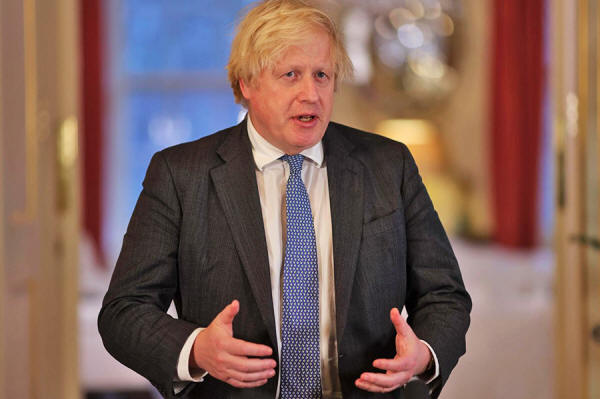|
by Joseph C. Sternberg speaks on the latest Covid-19 variant for a video message
recorded in London, Dec. 21.
leaders walk back as their plans' exorbitant price tag
becomes clear...
They've gotten a head start on that resolution, working hard at it even before Friday night's socially distanced parties begin.
The biggest, most entertaining and also most telling climb-downs are happening in the U.K. Prime Minister Boris Johnson in October unveiled an ambitious policy program to,
It was Mr. Johnson's public-relations coup ahead of the COP26 global climate conference he hosted in Glasgow.
It also was unusual in its honesty about what such environmental ambitions will cost individual households and businesses - a point politicians usually avoid for all the obvious reasons.
The most controversial component of Mr. Johnson's net-zero boondoggle concerns an attempt to steer households away from the gas boilers on which 86% of them rely for hot water and central heating.
Mr. Johnson said in October he hopes that by 2035 the government will be able to phase out installation of new natural-gas heating units.
That represents a step back from earlier plans to require carbon-efficient heat pumps in new homes as early as 2025, and the extended deadline still faces stiff opposition stemming from the high cost of heat pumps.
The proposed rules governing other structures such as new housing, residential conversions, and new mixed-use developments are so porous as to resemble a well-aerated Swiss cheese, with cost limitation emerging as the primary concern.
This difficulty installing charging stations augurs the collapse, sooner or later, of Mr. Johnson's announced plan to ban new internal-combustion cars by 2030.
Nor is this only a British phenomenon...
Set aside the brouhaha surrounding green provisions in Democrats' Build Back Better spending extravaganza in America. Some of the most surprising climate realism is now emerging in Europe.
French President Emmanuel Macron faces a campaign for re-election in 2022, and he learned the hard way in 2018 how higher fuel prices can trigger debilitating popular protests.
His solution is to double down on traditional French industrial policy, especially concerning support for nuclear power.
At Mr. Macron's behest, the European Commission in Brussels may be on the verge of including both nuclear and natural gas on a list of environmentally friendly energy sources eligible for "green investment" from governments and private investors.
Swedish teen 'activist' Greta Thunberg is dismayed, but she also doesn't need to persuade anyone to vote for her...
Even in Germany politicians are starting to change course.
But even in Germany there appears to be a limit.
The deal cementing the coalition between the Greens, the larger Social Democrats and the smaller Free Democrats hedges its climate commitments.
A coal phase-out will happen ideally by 2030 - with the newly inserted word "ideally" blunting Green ambitions by marking the whole project as tentative.
Carbon neutrality will wait for 2045, if it ever comes, and more-aggressive limits on aviation and automotive emissions are missing.
The net-zero gimmick will be with us for a long while yet, alas.
The green true believers (or are they bitter clingers...?) are busy devising rear-guard actions by which to insulate environmentalism from real-world political pressures, not least by enlisting gullible or cynical titans of finance to do via pension-fund investment allocations what can't be done honestly via legislation.
The political class remains rhetorically wedded to its earlier foolhardy promises, and the media is too enamored of reality-detached activists such as Ms. Thunberg...
All the smarter then for politicians to resolve to discuss the matter as little as possible in the year ahead.
As starving the atmosphere of carbon dioxide (CO2) becomes a political liability, starving the issue of political oxygen will become the electoral tactic of choice.
|


